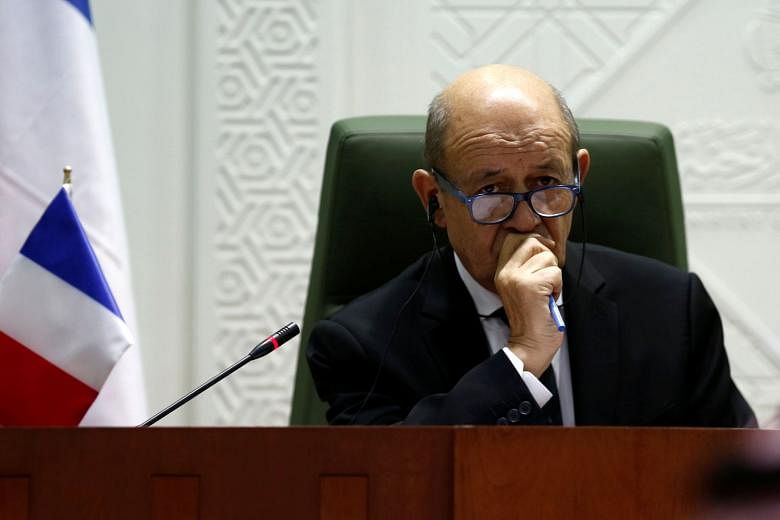ANKARA (Reuters, Bloomberg) - Iran has accused France of fuelling tension in the Middle East by taking a "biased" stance on Tehran's regional policy, and President Emmanuel Macron said Tehran misunderstood its "balanced" position.
"It seems that France has a biased view towards the ongoing crises and humanitarian catastrophes in the Middle East,"Foreign Ministry spokesman Bahram Qasemi was quoted as saying by state TV on Friday (Nov 17).
"This view fuels regional conflicts, whether intentionally or unintentionally." French Foreign Minister Jean-Yves Le Drian said on Thursday France was worried about Iran's involvement in the Middle East crisis and its disputed ballistic missile programme.
"Iran's role and the different areas where this country operates worries us," Le Drian told a joint news conference with his Saudi counterpart Adel Jubeir in Riyadh.
"I am thinking in particular of Iran's interventions in regional crises, this hegemonic temptation and I'm thinking of its ballistic programme," he said.
Iran has repeatedly rejected France's call for talks on its missile programme, saying it is defensive and unrelated to its 2015 nuclear agreement with world powers.
Asked at an EU summit in Gothenburg about Iran's accusations, Macron said Tehran misunderstood France's"balanced" position of talking to everyone and not taking sides between Sunni and Shi'ite Muslims.
"We want an Iran that is a less aggressive power and for its ballistic missile program to be curtailed. But Iran is a regional power and we speak to them," he said at a press conference in Gothenburg.
"The French line is to work for peace and not choose one side or the other. There are those who would like western countries to take sides between Shia and Sunni. We refuse. The role of France is to speak to everyone."
France sought to normalise relations with Iran after the 2015 nuclear deal. It has, however, been taking a harder stance on matters beyond the deal, including Iran's missile program and its regional role.
Iran has been counting on European support to counterbalance U.S. President Donald Trump's attacks on the nuclear accord and is worried about the erosion of that backing.
After Macron's visit to Saudi Arabia last week, Iran has said it wanted him to take a clearer stance and to "gauge Middle East developments with more awareness.
Paris suggested this week that new European Union sanctions against Iran could be discussed over its missile tests . But EU foreign policy chief Federica Mogherini seemed to dismiss that idea on Tuesday.
Shi'ite-dominated Iran and its regional arch-rival Sunni Saudi Arabia are involved in proxy wars across the region, backing opposite sides in Syria, Yemen, Iraq and Lebanon.
Jubeir told Reuters on Thursday that the kingdom's actions in the Middle East were a response to what he called the"aggression" of Iran.
Qasemi said Jubeir was repeating baseless claims, the state news agency IRNA reported on Friday.
"Saudi Arabia's foreign minister's gestures and his blame game will definitely not reduce the responsibility of this country in undermining the regional stability and security,"Qasemi said.

